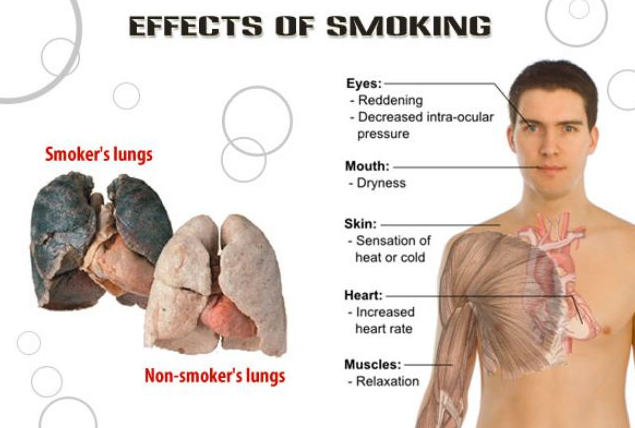/image%2F2372456%2F20171026%2Fob_d8a921_luffy6.jpg)

Tobacco usage has become more or less prevalent in our modern society in spite of its dangerous health effects. Tobacco is a plant that belongs to the family called solanaceae (nightshade family) and its botanical name is Nicotiana tabacum. The chemical nicotine, obtained from the leaves of tobacco together with other dangerous chemicals are associated with this plant. Tobacco smoke has more than 4,000 chemical compounds out of which 43 are cancer-causing compounds. Cigarette smokers are at high risk as smoking affects delicate organs in the body. The following enumerates adverse health effects of tobacco.
Tobacco affects the brain by stimulating the adrenal gland to release the hormone adrenaline. Adrenaline then stimulates the central nervous system and increases blood pressure, respiration and heart rate. Nicotine increases levels of the neurotransmitter called dopamine which affects the brain pathways. Long term changes of this effect results in addiction which has negative consequences. When an addicted user tries to quit, he or she experiences withdrawal symptom such as attention difficulties, irritability, sleeping disturbances and powerful cravings for tobacco.
Cigarette smoking accounts for about one-third of all cancer cases including 90 percent of lung cancer cases. Aside cancer, smoking causes lung diseases and increase the risk of developing heart diseases such as heart attack, stroke and vascular diseases. Smoking damages blood vessels and can make them grow narrower. As a result, this make the heart to beat faster hence increasing blood pressure. Smoking is also linked to diseases such as cataracts, leukemia and pneumonia. On average, adults who smoke die 14 years earlier than non-smokers.
In women, research has shown that cigarette smoking might increase the risk of developing breast cancer. Smoking can make it difficult for a woman to become pregnant. Pregnant women who smoke are at high risk of ectopic pregnancy, death of the baby before birth (stillbirth) and low birth weight of newborns due to decrease of blood flow to the placenta. Babies who are born to smoking mothers are at risk of dying young. Smoking can cause weaker bones, tooth loss and gum damages in both men and women. In men, smoking can cause infertility.
Non-smokers who inhale smokes from others who smoke are also at risk. People who inhale second hand smoke are at risk of developing or increasing cases of diseases such as asthma, bronchitis, pneumonia and impair blood circulation. A significant number of non-smokers die each year as a result of breathing second hand smoke from other smokers. It is advisable to stay away or keep a distance from those who smoke near you to avoid the hazardous effects of tobacco smoking.
According to the Center for Disease Control and Prevention (CDC), cigarette smoking causes more than 480,000 deaths each year in the United States, and causes more deaths each year than the following diseases combined.
1. Human Immunodeficiency Virus (HIV). 2. Illegal drug use. 3. Alcohol use. 4. Motor vehicle injuries. 5. Firearm-related incidents.
Tobacco addiction is a chronic disease that requires multiple attempts to quit. Most smokers need special assistant such as counselling and medication to help them quit. According to the World Health Organization (WHO), people who quit smoking before reaching the age of 50 decrease their risk of developing life threatening diseases by half after just one year, compared with continued smokers. Smoking is dangerous to your heath, therefore quit now!